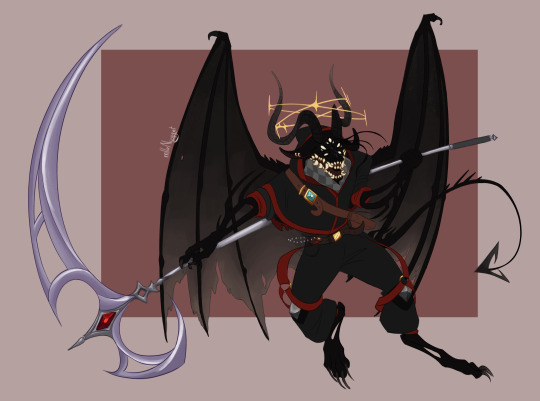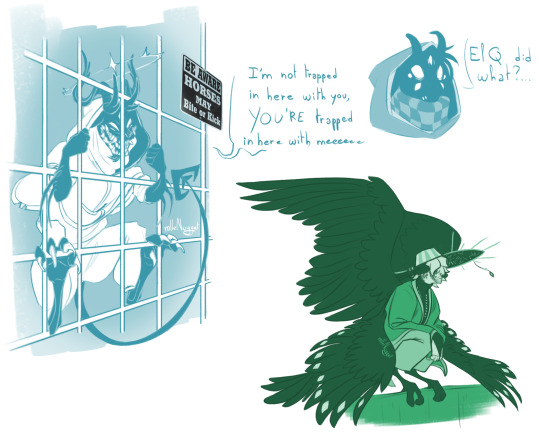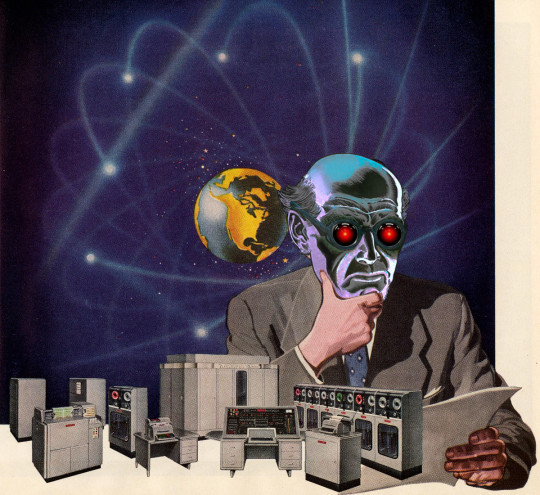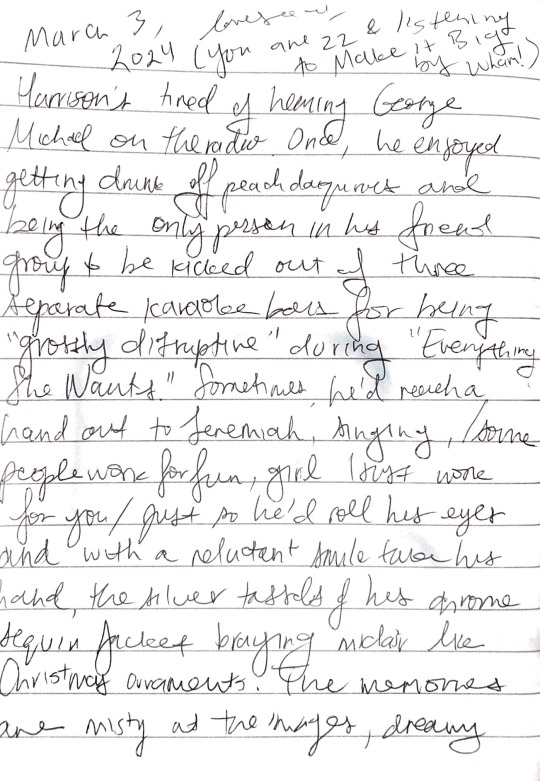#The Big Disrupter
Explore tagged Tumblr posts
Note
Swords pining for each other's cultivator is my new favorite type of pining. Love your NieYao content! <3
I don't suppose we could get Baxia or Hensheng throwing a tantrum while Jin Guangyao / Nie Mingjue are away, leaving their owners to deal with the embarrassing aftermath?
Also, do you have any recs you'd recommend with these two?

this is the exact moment Nie Huaisang realised he was going to have to start meddling in his big brother's love life (con't: 1, 2, 3, 4, 5)
Hensheng, on the other hand, doesn't throw tantrums but WILL sulk...

#guys if we keep this up this silly little idea is going to develop an actual plot#mdzs#nieyao#jin guangyao#jgy#nie mingjue#nmj#nie huaisang#nhs#nie bros#hensheng#baxia#and thank you very much i'm glad you're enjoying it!#honestly nieyao is just SUCH an intriguing dynamic but i feel like i have a hard time filtering it in the tags...#👀 so i'm grateful for anyone who delivers it right to my doorstep. obsessed w whatever the fuck they have going on#as for recs! tbh after i started going through my bookmarks i realised the fics you recced me tend to be G and most of my favourite bookmar#...are not that ^^;;; so these may not be to you taste idk#but my favourite nieyao fic is definitely Dawn Disrupts Us by Sciosa- the whole series really but i reread that one and its sequel regularl#Three Notes (or like i love you) by Wanxin was really good for 3zun...#All Men Are The Same by mostlikelytofangirl has fantastic dramatic irony big fan and also fuck jgs#those are 3 off the top of my head but if hmu if you wanna talk fics 👍#though i feel like i'm usually the one needing to beg for nieyao recs i feel like i'm always craving more ahahaha#especially ones that fit the dynamic i prefer since there's always a range#my art#edit: to add links to the other posts since this is honestly a big of a series at this point
247 notes
·
View notes
Text
rook and solas...narrative foils? rook? a narrative foil? to SOLAS? rook? to solas? ROOK? ROOK????
#IN FRONT OF MY ''I WOULD TREASURE THE CHANCE TO BE WRONG ONCE AGAIN MY FRIEND'' ?????????#da4 critical#datv critical#veilguard critical#rook has 0 QUALITIES THAT MAKE THEM A SUITABLE FOIL FOR LITERALLY ANYONE#rook has made NO mistakes ever. rook is good guy coded. treviso/minrathous is a nonstarter. a pointless shock value decision#rook experiences no real meaningful remorse over ANY bad thing theyve done because THEYVE NEVER DONE BAD THINGS#theyre good guy mcgee! happy go lucky hero! oopsie i disrupted the big bad's ritual teehee but actually it was ALL SOLAS' FAULT#rook is the most worthless piece of crap protagonist in history. they shouldnt even be allowed in the same room as solas#you want a nobody to somebody narrative foil? how about the person with a preexisting relationship with solas#whether the inquisitor romanced him hated him or was his best friend solas & the inquisitor are quite literally opposites#but better yet! the inquisitor actually feels like a real person! because rook is just biowares mary sue!#because this team had none of the gumption or drive of the old team & so of course they couldnt pull a game out of their butt in a crunch
80 notes
·
View notes
Text
I felt like making up "angwy uwu" designs for Phil and Bad cuz yknow the whole angel demon thing, with no real intent to create context for them, but by the time I finished them we had the Election Diner code incident and the kidnapping of Dapper which made me go [blinking white guy meme]


I gotta give huge props to OngakuK for giving me inspo on some aspects 'Cause designing godlike figures with tons of ornements and symbolism is her shit, so I sent her my first drafts and asked for feedback and she gave me really cool ideas
And here's some bonus mid-shapeshifting doodles

My og designs for them are much tamer : Phil has got far less pairs of wings and 20 eyes less & Bad has got far less teeth and one single lower jaw
#something something workers of death not supposed to be disrupting the course of life#but they sure are going to make an exception if you touch their kids#you can tell i sketched bad's wings as an afterthought because they physically make no sense#the scythe has zero respect for the wings and i only noticed it when i started colouring-- shush#I literally spent my whole week working 8 hours a day designing big creatures with big teeth big claws and tini angry eyes#what do i do when i get home ? Draw even more claws#qsmp#my art#qsmp fanart#mcyt#qsmp philza#qsmp badboyhalo#philza fanart#badboyhalo fanart
1K notes
·
View notes
Text
Big Tech disrupted disruption

If you'd like an essay-formatted version of this post to read or share, here's a link to it on pluralistic.net, my surveillance-free, ad-free, tracker-free blog:
https://pluralistic.net/2024/02/08/permanent-overlords/#republicans-want-to-defund-the-police

Before "disruption" turned into a punchline, it was a genuinely exciting idea. Using technology, we could connect people to one another and allow them to collaborate, share, and cooperate to make great things happen.
It's easy (and valid) to dismiss the "disruption" of Uber, which "disrupted" taxis and transit by losing $31b worth of Saudi royal money in a bid to collapse the world's rival transportation system, while quietly promising its investors that it would someday have pricing power as a monopoly, and would attain profit through price-gouging and wage-theft.
Uber's disruption story was wreathed in bullshit: lies about the "independence" of its drivers, about the imminence of self-driving taxis, about the impact that replacing buses and subways with millions of circling, empty cars would have on traffic congestion. There were and are plenty of problems with traditional taxis and transit, but Uber magnified these problems, under cover of "disrupting" them away.
But there are other feats of high-tech disruption that were and are genuinely transformative – Wikipedia, GNU/Linux, RSS, and more. These disruptive technologies altered the balance of power between powerful institutions and the businesses, communities and individuals they dominated, in ways that have proven both beneficial and durable.
When we speak of commercial disruption today, we usually mean a tech company disrupting a non-tech company. Tinder disrupts singles bars. Netflix disrupts Blockbuster. Airbnb disrupts Marriott.
But the history of "disruption" features far more examples of tech companies disrupting other tech companies: DEC disrupts IBM. Netscape disrupts Microsoft. Google disrupts Yahoo. Nokia disrupts Kodak, sure – but then Apple disrupts Nokia. It's only natural that the businesses most vulnerable to digital disruption are other digital businesses.
And yet…disruption is nowhere to be seen when it comes to the tech sector itself. Five giant companies have been running the show for more than a decade. A couple of these companies (Apple, Microsoft) are Gen-Xers, having been born in the 70s, then there's a couple of Millennials (Amazon, Google), and that one Gen-Z kid (Facebook). Big Tech shows no sign of being disrupted, despite the continuous enshittification of their core products and services. How can this be? Has Big Tech disrupted disruption itself?
That's the contention of "Coopting Disruption," a new paper from two law profs: Mark Lemley (Stanford) and Matthew Wansley (Yeshiva U):
https://papers.ssrn.com/sol3/papers.cfm?abstract_id=4713845
The paper opens with a review of the literature on disruption. Big companies have some major advantages: they've got people and infrastructure they can leverage to bring new products to market more cheaply than startups. They've got existing relationships with suppliers, distributors and customers. People trust them.
Diversified, monopolistic companies are also able to capture "involuntary spillovers": when Google spends money on AI for image recognition, it can improve Google Photos, YouTube, Android, Search, Maps and many other products. A startup with just one product can't capitalize on these spillovers in the same way, so it doesn't have the same incentives to spend big on R&D.
Finally, big companies have access to cheap money. They get better credit terms from lenders, they can float bonds, they can tap the public markets, or just spend their own profits on R&D. They can also afford to take a long view, because they're not tied to VCs whose funds turn over every 5-10 years. Big companies get cheap money, play a long game, pay less to innovate and get more out of innovation.
But those advantages are swamped by the disadvantages of incumbency, all the various curses of bigness. Take Arrow's "replacement effect": new companies that compete with incumbents drive down the incumbents' prices and tempt their customers away. But an incumbent that buys a disruptive new company can just shut it down, and whittle down its ideas to "sustaining innovation" (small improvements to existing products), killing "disruptive innovation" (major changes that make the existing products obsolete).
Arrow's Replacement Effect also comes into play before a new product even exists. An incumbent that allows a rival to do R&D that would eventually disrupt its product is at risk; but if the incumbent buys this pre-product, R&D-heavy startup, it can turn the research to sustaining innovation and defund any disruptive innovation.
Arrow asks us to look at the innovation question from the point of view of the company as a whole. Clayton Christensen's "Innovator's Dilemma" looks at the motivations of individual decision-makers in large, successful companies. These individuals don't want to disrupt their own business, because that will render some part of their own company obsolete (perhaps their own division!). They also don't want to radically change their customers' businesses, because those customers would also face negative effects from disruption.
A startup, by contrast, has no existing successful divisions and no giant customers to safeguard. They have nothing to lose and everything to gain from disruption. Where a large company has no way for individual employees to initiate major changes in corporate strategy, a startup has fewer hops between employees and management. What's more, a startup that rewards an employee's good idea with a stock-grant ties that employee's future finances to the outcome of that idea – while a giant corporation's stock bonuses are only incidentally tied to the ideas of any individual worker.
Big companies are where good ideas go to die. If a big company passes on its employees' cool, disruptive ideas, that's the end of the story for that idea. But even if 100 VCs pass on a startup's cool idea and only one VC funds it, the startup still gets to pursue that idea. In startup land, a good idea gets lots of chances – in a big company, it only gets one.
Given how innately disruptable tech companies are, given how hard it is for big companies to innovate, and given how little innovation we've gotten from Big Tech, how is it that the tech giants haven't been disrupted?
The authors propose a four-step program for the would-be Tech Baron hoping to defend their turf from disruption.
First, gather information about startups that might develop disruptive technologies and steer them away from competing with you, by investing in them or partnering with them.
Second, cut off any would-be competitor's supply of resources they need to develop a disruptive product that challenges your own.
Third, convince the government to pass regulations that big, established companies can comply with but that are business-killing challenges for small competitors.
Finally, buy up any company that resists your steering, succeeds despite your resource war, and escapes the compliance moats of regulation that favors incumbents.
Then: kill those companies.
The authors proceed to show that all four tactics are in play today. Big Tech companies operate their own VC funds, which means they get a look at every promising company in the field, even if they don't want to invest in them. Big Tech companies are also awash in money and their "rival" VCs know it, and so financial VCs and Big Tech collude to fund potential disruptors and then sell them to Big Tech companies as "aqui-hires" that see the disruption neutralized.
On resources, the authors focus on data, and how companies like Facebook have explicit policies of only permitting companies they don't see as potential disruptors to access Facebook data. They reproduce internal Facebook strategy memos that divide potential platform users into "existing competitors, possible future competitors, [or] developers that we have alignment with on business models." These categories allow Facebook to decide which companies are capable of developing disruptive products and which ones aren't. For example, Amazon – which doesn't compete with Facebook – is allowed to access FB data to target shoppers. But Messageme, a startup, was cut off from Facebook as soon as management perceived them as a future rival. Ironically – but unsurprisingly – Facebook spins these policies as pro-privacy, not anti-competitive.
These data policies cast a long shadow. They don't just block existing companies from accessing the data they need to pursue disruptive offerings – they also "send a message" to would-be founders and investors, letting them know that if they try to disrupt a tech giant, they will have their market oxygen cut off before they can draw breath. The only way to build a product that challenges Facebook is as Facebook's partner, under Facebook's direction, with Facebook's veto.
Next, regulation. Starting in 2019, Facebook started publishing full-page newspaper ads calling for regulation. Someone ghost-wrote a Washington Post op-ed under Zuckerberg's byline, arguing the case for more tech regulation. Google, Apple, OpenAI other tech giants have all (selectively) lobbied in favor of many regulations. These rules covered a lot of ground, but they all share a characteristic: complying with them requires huge amounts of money – money that giant tech companies can spare, but potential disruptors lack.
Finally, there's predatory acquisitions. Mark Zuckerberg, working without the benefit of a ghost writer (or in-house counsel to review his statements for actionable intent) has repeatedly confessed to buying companies like Instagram to ensure that they never grow to be competitors. As he told one colleague, "I remember your internal post about how Instagram was our threat and not Google+. You were basically right. The thing about startups though is you can often acquire them.”
All the tech giants are acquisition factories. Every successful Google product, almost without exception, is a product they bought from someone else. By contrast, Google's own internal products typically crash and burn, from G+ to Reader to Google Videos. Apple, meanwhile, buys 90 companies per year – Tim Apple brings home a new company for his shareholders more often than you bring home a bag of groceries for your family. All the Big Tech companies' AI offerings are acquisitions, and Apple has bought more AI companies than any of them.
Big Tech claims to be innovating, but it's really just operationalizing. Any company that threatens to disrupt a tech giant is bought, its products stripped of any really innovative features, and the residue is added to existing products as a "sustaining innovation" – a dot-release feature that has all the innovative disruption of rounding the corners on a new mobile phone.
The authors present three case-studies of tech companies using this four-point strategy to forestall disruption in AI, VR and self-driving cars. I'm not excited about any of these three categories, but it's clear that the tech giants are worried about them, and the authors make a devastating case for these disruptions being disrupted by Big Tech.
What do to about it? If we like (some) disruption, and if Big Tech is enshittifying at speed without facing dethroning-by-disruption, how do we get the dynamism and innovation that gave us the best of tech?
The authors make four suggestions.
First, revive the authorities under existing antitrust law to ban executives from Big Tech companies from serving on the boards of startups. More broadly, kill interlocking boards altogether. Remember, these powers already exist in the lawbooks, so accomplishing this goal means a change in enforcement priorities, not a new act of Congress or rulemaking. What's more, interlocking boards between competing companies are illegal per se, meaning there's no expensive, difficult fact-finding needed to demonstrate that two companies are breaking the law by sharing directors.
Next: create a nondiscrimination policy that requires the largest tech companies that share data with some unaffiliated companies to offer data on the same terms to other companies, except when they are direct competitors. They argue that this rule will keep tech giants from choking off disruptive technologies that make them obsolete (rather than competing with them).
On the subject of regulation and compliance moats, they have less concrete advice. They counsel lawmakers to greet tech giants' demands to be regulated with suspicion, to proceed with caution when they do regulate, and to shape regulation so that it doesn't limit market entry, by keeping in mind the disproportionate burdens regulations put on established giants and small new companies. This is all good advice, but it's more a set of principles than any kind of specific practice, test or procedure.
Finally, they call for increased scrutiny of mergers, including mergers between very large companies and small startups. They argue that existing law (Sec 2 of the Sherman Act and Sec 7 of the Clayton Act) both empower enforcers to block these acquisitions. They admit that the case-law on this is poor, but that just means that enforcers need to start making new case-law.
I like all of these suggestions! We're certainly enjoying a more activist set of regulators, who are more interested in Big Tech, than we've seen in generations.
But they are grossly under-resourced even without giving them additional duties. As Matt Stoller points out, "the DOJ's Antitrust Division has fewer people enforcing anti-monopoly laws in a $24 trillion economy than the Smithsonian Museum has security guards."
https://www.thebignewsletter.com/p/congressional-republicans-to-defund
What's more, Republicans are trying to slash their budgets even further. The American conservative movement has finally located a police force they're eager to defund: the corporate police who defend us all from predatory monopolies.

Image: Cryteria (modified) https://commons.wikimedia.org/wiki/File:HAL9000.svg
CC BY 3.0 https://creativecommons.org/licenses/by/3.0/deed.en
#pluralistic#coopting disruption#law and political economy#law#economics#competition#big tech#tech#innovation#acquihires#predatory acquisitions#mergers and acquisitions#disruption#schumpeter#the curse of bigness#clay christensen#josef schumpeter#christensen#enshittiification#business#regulation#scholarship
290 notes
·
View notes
Note
But how would Bruce sweep in to help the Kents without raising suspicion on himself? Even if he did it anonymously, theres few people in Gotham that could have the power to so quickly get them out of the public eye. And if he does it publicly, I'm assuming he claims he was doing it to protect the JL as Bruce publicly funds them? Or would he essentially release a statement saying that as a close friend of Clark Kent, he wishes to protect him from the media as he of all people knows how vicious they can be? Idk, I completely agree that Bruce would be the one to get them out, the question is just how?
My heart also breaks for Clark because this is obviously one of the last things he ever wanted to occur. Superman's love for humanity is obvious to everyone and the loss of his civilian identity destroys any chance of him being able to interact with them outside of his superhero identity. Its one thing having to wait for something in the media to 'blow over' but this isn't your everyday politic scandal or other media story, this is the reveal of the man behind one of the Trinity itself, the reveal of Superman. It could easily take months before it stops being the front page cover of every newspaper and after that, what then? How do they move forward?
And all of this doesn't even begin to consider the guilt Clark would feel for ruining Lois and the kids' lives. Everyone would reassure him it wasn't his fault but Clark would obviously take responsibility for this, telling himself he should have been more careful, more secretive, more vigilant. That as a result of his lack of caution, he'd ruined any chance his kids and Lois had at a (somewhat) normal life. I feel like I could even see him being embarrassed to accept Bruce's help, chastising himself for not planning for contingencies like Bruce had.
Sorry to dump all this on you, I'm just so intrigued by the aftermath of the reveal itself.
No it’s a very valid question! In that media/public world, getting them out of the public eye as quickly as possible is the number one priority. That doesn’t need to be attributed to Bruce right away, or even at all — the Kents (all of them) disappear as quickly as possible. They fly to an agreed-upon rendezvous or they are taken there by private security hired by Bruce.
Once there, that’s when the PR shitstorm hits. Superman and his family are found out, maybe there were a few brief videos of them leaving or being escorted out of their workplace (Lois) or flying away from their school (Jon) but nothing long, nothing conclusive.
The media cycle begins. Interviews with the Kent’s’ friends, colleagues, neighbors, etc proliferate the news. Everyone is cashing in on what they can. Bruce, if he’s smart, has Clark and his family locked down somewhere they can’t watch television and is handling the response on his own.
But the reality is, there is not much Bruce CAN do, for the reasons you mentioned. Publicly tying himself to Superman and his family puts WE under greater scrutiny. Coming out in defense of Clark’s lies suggests he 1) knew about them and 2) approves of Superman’s decision to hide from the public.
I’m not sure that conversation between friends will go well. Bruce telling Clark there’s no way to return to their previous lives, not without significant security risks (not to mention the social strain) and Clark spiraling as he realizes he’s inadvertently taken away his Ma’s knitting circle, Lois’ job, Jon’s school.
It’s all different now. If he’s lucky, Bruce has plans to funnel them into a sort of witness protection, maybe in a few years when things settle down. But that would mean splitting them up — and that’s non negotiable. Even keeping Ma and Pa together is a stretch. They’re too easily recognizable.
I imagine maybe Bruce can give them a sort of asylum in the Watchtower, operating outside of any Earth’s jurisdiction. But that puts scrutiny on the Justice League instead. And Bruce is the kind of person to keep the JL autonomous and take the heat on WE if needed — even if he never mentions it.
There are things that Bruce would need to step in on: connections starting to be made between himself and Clark, accusations of Clark not being a US citizen (and Jon too, but because he’s an alien) and Lois for lying to the US government. Accusations that the Justice League was culpable in any way for Superman’s civilian actions. Scrutiny on WE and how much Bruce Wayne knows or should know, or how his funding is connected to a JL that is now under investigation etc.
But yes: I think Bruce could get them out and hidden without tipping his hand. But everything else, yeah, he would need to step into the spotlight at least a little. And he would do that for Clark, because that’s his friend. He’s had this complex series of contingencies ready since…maybe Clark and Lois’ engagement?
Having been in some PR crises, you need a Bruce. Someone not affected directly and cool/calm enough to speak to media, move people around, and make judgement calls. Clark is lucky he has such a friend, even if he’s beating himself up over his own actions and missteps.
I have more (probably more coherent) thoughts about this, but that’s my initial reaction — Bruce gets them out fine, but next steps are very, very complicated. And things won’t ever be normal again.
#actually maybe the only thing big enough to disrupt that news cycle#is Bruce unmasking himself tbh#hmmm#bruce wayne#batman#dc#asks#anon#batfamily#clark kent#superman#superfamily#Lois lane#jonathan kent
137 notes
·
View notes
Text



Sam and all his bountiful encouragement. 🧡
#Green Eggs and Ham#Dr Seuss#GEaH#ms paint#artists on tumblr#sketch#sketches#doodle#doodles#fanart#briefcase buddies#the third image was gonna have Sam look back with big doe eyes/eyelashes fluttering to disrupt Guy#and Guy just looks back miffed saying 'Stop it.'#blvdart
250 notes
·
View notes
Text

ENGINEER WOODY ENGINEER WOODY :DD
#cheez rambles#dash games#woody#pets#my art#fandom character#tf2 engineer#// my big handsome son <:] he was being extremely disruptive while i was trying to draw this <3#// australian ahh cat but he gets to be engie bc engie is awesome :D
139 notes
·
View notes
Text
It was crazy watching bkdk go from the most hated ship to the most popular ship in the fandom
#idk something i was thinking about#i also used to not like it if i'm being completely honest#i used to be a big td dk shipper#i still like them too!! i just like bkdk more nowadays#i remember when you could say “i like bakudeku” and everyone would move 10 feet away from you and act like you're a witch#i was in an amino group chat (LMAO) and tentatively said “i like bakudeku” and someone was like “bakudeku is so toxic why” and i was like#“oh fuck i don't wanna disrupt the harmony of the group chat” so then i backtracked and i was like “haha yeah i only like them in AUs”#to that person i like them canon compliant the most and always have i lied sorry#bkdk#bakudeku#katsudeku#side note the big reason i stopped being so into td dk is bc at the point where i JUST started liking bkdk i didn't like how a bunch of#td dk shippers would treat katsuki like he was izuku's toxic ex or something or they would use td dk to shit on bkdk#idk how that is nowadays but i used to see it in fic and it kinda just pissed me off too much so i had to step away 😭#i am a multishipper for life tho i'll go back to them someday. also tdbkdk is really good too.#i spaced out td dk so it doesn't show in their tags i hope it works 😭 if it doesn't i love them please believe me#I DO REMEMBER THIS ONE REALLY GOOD VILLAIN DEKU FIC I WAS READING BEFORE STEPPING AWAY FROM THE SHIP#i think it was unfinished i can't remember the name :(
47 notes
·
View notes
Text
just remembered I’m not going to see challengers in theatres for at least another 10 years if ever

#like it’s never going to hit the same way on a small screen#I need trent reznor and atticus ross to be pounding in my eardrums disrupting me from#from hearing important dialogue#I need the trios big ass faces to jumpscare me as the movie begins#I need—#challengers#challengers movie#shea.stuff
22 notes
·
View notes
Text
Kay, thanks for this link, reading the essay was almost quasi-religious to this lifelong atheist. It's an absurdly optimistic piece and all the more rebellious for it, I think.
I could quote so much more from it, but perhaps this is the most relevant bit right now...
For radicals, fetishizing the guillotine is just like fetishizing the state: it means celebrating an instrument of murder that will always be used chiefly against us.
Those who have been stripped of a positive relationship to their own agency often look around for a surrogate to identify with—a leader whose violence can stand in for the revenge they desire as a consequence of their own powerlessness. In the Trump era, we are all well aware of what this looks like among disenfranchised proponents of far-right politics. But there are also people who feel powerless and angry on the left, people who desire revenge, people who want to see the state that has crushed them turned against their enemies.
Reminding “tankies” of the atrocities and betrayals state socialists perpetrated from 1917 on is like calling Trump racist and sexist. Publicizing the fact that Trump is a serial sexual assaulter only made him more popular with his misogynistic base; likewise, the blood-drenched history of authoritarian party socialism can only make it more appealing to those who are chiefly motivated by the desire to identify with something powerful.
-Anarchists in the Trump Era
Now that the Soviet Union has been defunct for almost 30 years—and owing to the difficulty of receiving firsthand perspectives from the exploited Chinese working class—many people in North America experience authoritarian socialism as an entirely abstract concept, as distant from their lived experience as mass executions by guillotine. Desiring not only revenge but also a deus ex machina to rescue them from both the nightmare of capitalism and the responsibility to create an alternative to it themselves, they imagine the authoritarian state as a champion that could fight on their behalf. Recall what George Orwell said of the comfortable British Stalinist writers of the 1930s in his essay “Inside the Whale”:
“To people of that kind such things as purges, secret police, summary executions, imprisonment without trial etc., etc., are too remote to be terrifying. They can swallow totalitarianism because they have no experience of anything except liberalism.”
#to be clear i feel the same way abput gun violence as i do about the guillotine: it won't save you it will only lead to more dead people#and they won't by any means all be the 'right kind' of dead people#you make one individual judge jury and executioner and you open to door to others who won't be doing it for the same values#are you all so really devoid of hope that you'd rather grimly cheer an act of desperation than think about how to change the system?#this entire thing is unedifying to watch. the responses are cringe as hell - almost as cringe as your folk hero himself#i don't know do i need to say explicitly that i think the us healthcare system is fucked? it's eugenics by capitalism. it's horrendous.#you can't fix it by shooting ceos though do you. do any of you really believe that??#the most milquetoast hollywoodised folk ballad going on here. this man is no joe hill.#this is like. cheering the class clown for disrupting five minutes of the teacher's time#even though it means you'll all be staying on five minutes late at the end#the number of people i thought better of who seem to think this circus is justice or presents a solution is astounding#anyway maybe that's why this article hit me so hard this morning. i needed that big fat dose of heady optimism to counter#the cynical lust for vengeance i'm seeing everywhere else.#don't you want to be better than them?#things i can laugh at: historical arctic cannibalism. things i guess i can't: this whole mess#i don't mourn the ceo not one bit! but they'll put a new one in place with better security and life will go on much as before#taking any execution as a victory is honestly grotesque to me#crimethinc#anarchy#anti-violence#today i will mostly be listening to let 'em dangle by elvis costello again i guess
12 notes
·
View notes
Text

#kirby#daily kirby#my art#digital#hal laboratory#nintendo#my partner's friends have a big important camping trip they've been planning for a whole year tomorrow#and me and my wife are also invited#camping is Tricky for me#between the illness and the army experience being Miserable#plus since it's a big group of people The Autism comes into play too -n-#but my wife and partner have worked together to accommodate me only staying for one night even though everyone else is staying for 3#(which also means daily drawings will not be disrupted even though I'm leaving my tablet at home!)#so I am looking forward to touching trees or whatever people do when they're camping not-for-work#(I wouldn't know literally my only experiences of camping were in the army)#(I have been promised I will not have to sleep directly in the mud and I will not be woken up for a guard shift)#(so like. it should be fine.)#favorites
110 notes
·
View notes
Note
curled up like a shrimp thinking of tang bo rn ngl. when i first read through most of rotbb i kept trying to think of a tang bo returns au that would have not affected the tang arc so much bc i loved the way it flowed in canon but its so hard to put him anywhere else because tang bo would have added so much comedy to the already chaotic order of events there lmao. TANGCHUNG ARE SO CRAZY AND NO ONE HAS CONTEXT FOR THEMMMM it drives me insaneeee. what i wouldnt give to experience tang gunak's pov on them. WEIRDOS!
I KNOWW theyre both such ding dongs i feel like in essentially any tangchung au, you just have to give up on trying to keep it as close to canon as possible cuz i just cant imagine them ever acting normal if they got together, ESPECIALLY in tang bo returns aus, there is just no denying the explosive disruptive reunion theyd have.. sniffles.. they deserve to be a little ooc in the grand scheme of things..
#im still more of a big fan of tangchung taking one look at each other and quickly hiding themselves away so they can be alone together#but even still that would be disruptive and almost ooc in canon..leaving everyone to fend for themselves and left wondering..
15 notes
·
View notes
Text
i get so irrationally upset when people draw rinnosuke genderbend fanart. gensokyo's he/hims are a protected species you fucking idiot do have any idea the kind of ecological ruin you're causing
#you can even still draw him with big naturals idc#just don't disrupt the delicate biosphere#touhou#rinnosuke morichika
49 notes
·
View notes
Text


giant paragraph I wrote tonight where harrison makes enemies with george michael… handwritten version is the first draft & made some minor changes below:
Harrison’s tired of hearing George Michael on the radio. Once, he enjoyed getting drunk off peach daiquiris and being the only person in his friend group to be kicked out of three separate karaoke bars for being “grossly disruptive” during Everything She Wants. Sometimes, he’d extend a hand to Jeremiah sitting amused on the sectional, singing some people work for fun, girl I just work for you, just so he’d roll his eyes and with a reluctant laugh, take his hand, the silver tassels of his chrome sequin jacket braying midair like Christmas ornaments. They’d shout the lyrics together, every uh-huh, every la, la, la, back to back like Richard Gere and Julia Roberts on the cover of Pretty Woman. The memories are misty at the edges, dreamy tiles of a rotating disco ball because Jeremiah was a dream, half an angel and certainly more than a man. It feels, then, apt to be haunted—by pillar candles, silk sheets, vintage analog clocks, Annie’s mac and cheese right from the pot, silver sedans, the scent of nail polish remover, blue snow cones, disposable cameras, back issues of XY, green gummy bears, losing at checkers, motel pools, bootleg copies of Sleepy Hollow and Silence of the Lambs and The Blair Witch Project, sharing instant coffee on a loveseat, the texture of velvet, halving a granny smith apple in the dark, orange Tic-Tacs, veggie pizza, movie ticket stubs, brown eyes in the sun, fur coats, the sound of George Michael’s voice.
#in a way this is the harrison version of the jeremiah faith by george michael flash#does lonan get long ass paragraphs where harrison thinks of every possible detail that reminds him of him?? DON'T THINK SO!!!#not fair bc harrison loves careless whisper. what are you going to do now about careless whisper#JUST LISTENED TO CARELESS WHISPER ON MY MAKE IT BIG VINYL BTW VINTAGE PRESSING & IT'S SOOO DIFF TO THE#RECORDING I KNOW…!! V DRAMATIC#anyway harrison could be grossly disruptive around me like that’s fine#friend group is a loose term btw he’s talking about Jeremiah’s friends who don’t like him lolllll#lost gods
14 notes
·
View notes
Text
.
#if I may be petty for a moment lol#and I feel bad for being annoyed bc I know people mean well#but like trying to explain to people the chronic migraine thing#and hearing “oh I get headaches a lot too” “try taking a nap” “try getting some air” “try migraleve“ ”these things work for me!“#my fellow children of christ. i am happy for you that you don't understand#but fuck me that lack of understanding is so frustrating#and i feel guilty that before all this started i probably would've said similar things. meaning well. not understanding.#but yeah i can just tell sometimes that ppl don't really think it's a big deal#and its just another annoying thing to deal with on top of my brain misfiring all the fucking time and the chronic disruption to my life#anyway rant over
7 notes
·
View notes
Text
In order to maximize disruption across the network this holiday season, we’ll be using AI to determine what sections of the network to close for maintenance. It’s already suggested Clapham Junction and the entire West Coast Main Line, so things are going well.
#Network rail#trains#This sounds like an optimization problem to me so it probably means a bunch of linear algebra#And despite being big piles of linear algebra none of the LLM’s we tried gave a good answer to “minimize disruption”#Fortunately we were trying to maximize disruption instead
3 notes
·
View notes